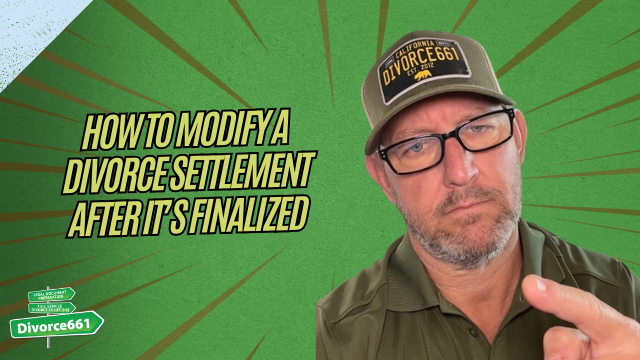How to Modify a Divorce Settlement After It’s Finalized
Divorce is often seen as a definitive end, but life continues to evolve after the ink dries on those legal documents. In California, certain aspects of a finalized divorce can be modified, allowing individuals to adapt their agreements to better fit their changing circumstances. Let’s explore what can and cannot be changed in a divorce settlement, how to navigate modifications, and real-life examples of successful adjustments.
Understanding the Flexibility of Divorce Settlements
Many people believe that once a divorce judgment is finalized, it cannot be altered. However, this isn’t entirely true. In California, specific components of a divorce settlement—such as spousal support, child support, custody, and visitation—can be adjusted under certain conditions. This section will break down which elements can be modified and the circumstances that warrant such changes.
What Can Be Changed?
The primary areas of a divorce settlement that can be modified include:
- Spousal Support: Also known as alimony, spousal support can be modified if there’s a significant change in financial circumstances, like job loss or a substantial increase in income for either party.
- Child Support: Changes in income or the financial needs of the child can lead to adjustments in child support arrangements.
- Custody and Visitation: Modifications can be made if there are significant changes in circumstances, such as relocation or changes in the child’s needs.
What Cannot Be Changed?
While there is flexibility in certain areas, others remain fixed:
- Property Division: Once property division is finalized, it generally cannot be modified. This includes the allocation of assets and debts acquired during the marriage.
Significant Changes in Circumstances
To successfully modify a divorce settlement, one must demonstrate a significant change in circumstances. Here are some examples that could support a modification request:
- Job Loss: If a person who pays spousal or child support loses their job, they may need to request a decrease in their obligations.
- Relocation: If one parent must move to a different city or state, it can impact visitation and custody arrangements.
- Health Issues: Changes in health for either parent or the child can necessitate a modification to ensure adequate care.
The Process of Modifying a Divorce Settlement
Modifying a divorce settlement in California involves several steps. Understanding this process can make the journey smoother and more efficient.
Filing a Request for Order (RFO)
The first step is to file a Request for Order (RFO) with the family court. This document outlines the specific changes being requested and the reasons for those changes. It’s essential to serve this document to the other party, who will have an opportunity to respond.
Providing Evidence
To support the modification request, the filing party must provide evidence of the significant change in circumstances. This could include:
- Financial documents such as pay stubs and tax returns.
- Medical records or reports from healthcare providers.
- School records or reports from educational professionals.
- Witness statements that can attest to the changes in circumstances.
Mediation or Settlement Discussions
Before a court hearing, parties may be encouraged to participate in mediation or settlement discussions to reach an agreement without going to trial. Mediation can often be less adversarial and more cost-effective.
Court Hearing
If mediation fails, the case will proceed to a court hearing. Both parties will present their evidence and arguments, and the judge will make a decision based on the best interests of any children involved or the financial circumstances of the parties.
Issuance of Modified Order
If the judge approves the modification, a new court order will be issued that reflects the changes. Both parties must comply with the terms of this modified order.
Real-Life Case Study: Reducing Spousal Support
To illustrate the process, let’s consider a real-life example. A client had been paying spousal support for several years. However, after losing their job, the client sought relief and contacted us for assistance. We filed updated financial disclosures along with a motion to modify the support amount. The court accepted the changes, approving a reduction based on the client’s new financial situation. This case demonstrates that with the right approach, adapting to life’s changes is not only possible but also achievable.
Why Choose Divorce661 for Modifications?
At Divorce661, we understand that life changes can necessitate adjustments in divorce settlements. Here’s why you should consider us for your modification needs:
- Flat-Fee Services: We offer a flat-fee service to file and prepare your modification request, making it affordable and predictable.
- Comprehensive Support: We handle all financial disclosures and timelines, allowing you to focus on other aspects of your life.
- Mutual Agreements: When both parties agree to modifications, the process becomes faster and easier—often without the need for attorneys.
Taking the First Step
If you need to modify support or custody after your divorce, take the first step by visiting Divorce661.com for a FREE consultation. Our team is ready to assist you in navigating the modification process, ensuring that your judgment reflects your current circumstances.
Engage with Us
Have your circumstances changed since your divorce was finalized? We want to hear from you! Comment below with your experiences or any questions you may have regarding divorce modifications.
In summary, while a divorce settlement may feel permanent, California law allows for modifications under specific circumstances. By understanding the process and working with a knowledgeable team, you can adapt your agreement to better suit your current life situation.


